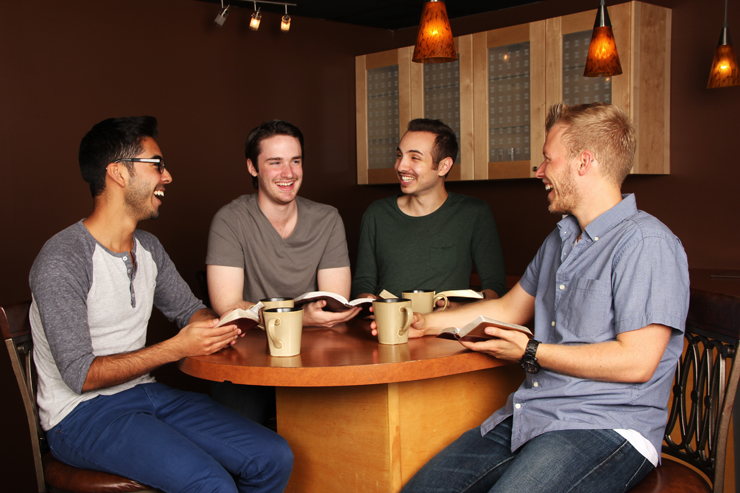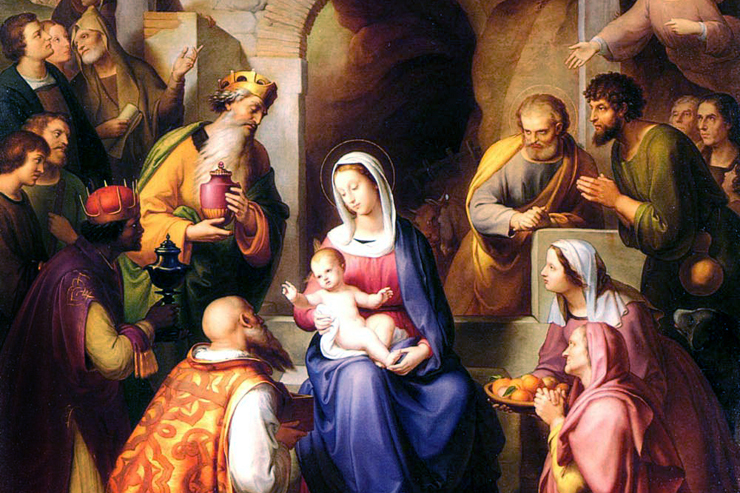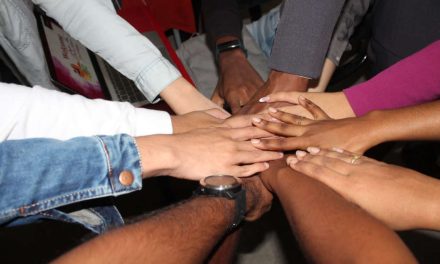 “I am a rock. I am an island.” These words from an old Simon and Garfunkel song sum up how I viewed the need for close friendships for most of my life. The stubbornness and pride that had led me to walk away from the Baptist Church as a teenager had manifested themselves as a formidable wall around my heart and a reflexive need to keep others at an emotional distance. I was self-sufficient and thought I had it all figured out as I was growing my career after college and focused on work and little else. Then I met my wife in my late twenties and the wall around my heart began to crumble as I started sharing my life with someone I loved.
“I am a rock. I am an island.” These words from an old Simon and Garfunkel song sum up how I viewed the need for close friendships for most of my life. The stubbornness and pride that had led me to walk away from the Baptist Church as a teenager had manifested themselves as a formidable wall around my heart and a reflexive need to keep others at an emotional distance. I was self-sufficient and thought I had it all figured out as I was growing my career after college and focused on work and little else. Then I met my wife in my late twenties and the wall around my heart began to crumble as I started sharing my life with someone I loved.
Although these were still my pre-Catholic years in the spiritual wilderness, I can look back and see my marriage and enduring love for my wife as the first steps in God’s efforts to bring me back to a relationship with Him. When each of my sons were born, the wall around my heart eroded further and continued steadily until the fall of 2005 when I experienced a profound conversion to Christ. I wrote extensively about my conversion to the Catholic Church in my second book Along the Way: Lessons for An Authentic Journey of Faith, and won’t devote much time to it here. What is important is to recognize that I came to the place when the wall around my heart was largely gone after years of the Holy Spirit and my unconditional love for my family working on me. I surrendered to Christ and stopped trying to compete with Him for control. I gave up everything to Him and received back everything I needed (not necessarily what I might have wanted). I went from saying no to God for over two decades to saying yes, and that has had an incredible impact on my life and family.
So, what does this have to do with friendship?
After I surrendered to Christ and began RCIA to enter the Catholic Church on the Feast of Christ the King in 2006, I began experiencing a need for friendship with other Catholic men and a desire to end my self-imposed lonely exile. I sought out husbands, fathers, and business people in my parish community who I could go to for help and, in turn, I could help as well. It took me surrendering to Christ and letting go of my emotionally walled-off old self to recognize how much I needed to have Catholic brothers in my life. My surrender came from a place of humility and the recognition that I was not self-sufficient. I needed people outside of my immediate family to help and encourage me on the journey in front of me. I also needed a group of friends to be brutally honest with me and help me stay on the right track.
In 2007 I formed a group of Catholic businessmen with the help of Deacon Mike Bickerstaff. The goal was to gather together once a month with like-minded Catholic men from the Atlanta business community who wanted to more fully integrate their faith with their work. Many of those men are still in the group and we have added others over the years. We come together for prayer, a Gospel reflection, and talk through topics relevant to living out our faith at work and the public square. The group often does service projects together where we involve our families. We also have very candid conversations and open sharing built on trust and the knowledge that we will keep the conversations confidential and not judge each other. I value these conversations more than I can ever express with the written word.
This group of men is my bedrock. I can count on them and they, in turn, can count on me. I get honesty, encouragement, support, and every now and then a well-deserved kick in the pants from these great men. These are my brothers in Christ and I am grateful for them. The Church, parishes, and many other organizations offer a number of good options for Catholic men seeking friendship and brotherhood. One such organization is the Knights of Columbus. I am an inactive Second Degree Knight, primarily because of the weeknight schedule with my sons and their various activities, but I love the mission of the Knights of Columbus and everything they stand for. Because of my admiration for the Knights, I reached out to Brian Caulfield to get his thoughts on the importance of friendship and brotherhood for Catholic men.
Brian is the editor of the website FathersforGood.org, sponsored by the Knights of Columbus Supreme Council, and is a communications specialist in the Office of the Supreme Knight in New Haven, Connecticut. Since December 2011 he also has served as Vice Postulator of the Cause for Canonization of Father Michael McGivney, the founder of the Knights of Columbus who holds the title of Venerable. Brian served as editor of the book Man to Man, Dad to Dad: Catholic Faith and Fatherhood (Pauline, 2013).
~~~~~
Brian, I have long appreciated the wonderful ministry work you do for Catholic men through your work with the Knights of Columbus and your FathersforGood.org website. I am curious to capture your thoughts on the need for fellowship and encouragement among Catholic men. Why is this so important?
“Men face a number of challenges in today’s culture but the most basic involve questions about the very nature of manhood and masculinity. For decades, men, in particular fathers, have been portrayed in popular media as clueless and often dangerous. In television and movies, if Dad isn’t being led around by his wise wife and hoodwinked by his wise-guy children, then it’s likely that he’s a macho philanderer or even an abuser. I generalize, of course, but there is a definite trend in this direction.
“Add to this the fact that over the same decades there has been an increase of broken homes and children losing contact with their divorced father, and you have a crisis of manhood and fatherhood.
“So, yes, men have a special need these days to bond in fellowship with other men. They need to be fathered and mentored, they need to feel comfortable in their masculinity among other men and accepted by them. Of course, this is a goal of the organization I work for, the Knights of Columbus, but there are other men’s movement groups that guys can look to.”
What are the obstacles keeping Catholic men from relying on each other for support and help in excelling in our faith, at home, and at work?
“Well, there’s a trust factor. Guys are famous for not being comfortable with ‘sharing’ at least on an emotional level. But there are many guy activities that bring men together—watching sports, playing sports, talking cars, tools, and gadgets. Yet so much of a man’s time today is centered around family life, if he’s married, because men are expected to pull a fair share of child care and household chores. This is a good thing because it supports the most important bond of a husband with his wife. But it also discourages the type of man to man sharing and bonding that can be healthy for masculine development. I think the answer is for husband and wife to discuss a guy’s need to reach out and bond with other men in order to become a better husband and father, and a guy’s need to lead as spiritual head of the family, as dynamic worker and breadwinner and authority figure with the children. I may be wrong, but I think if husband and wife have an honest and trustful discussion, they can work out a healthy balance that is so vital for marriage.”
For the shy or nervous Catholic man interested in connecting with other Catholic brothers in his parish or local community but is not sure how to do it, what would be your advice?
“Even shy guys can volunteer, show up, and get the job done. Guys relate by working together, testing one another, supporting one another, and if a shy guy works hard and is reliable, he will be accepted.”
Can you share an example from your own life or the life of someone you know where the impact of Catholic brotherhood made a significant difference?
“In my experience with the Knights of Columbus, I have seen faith and fraternity in action. Perhaps the most notable example can be seen after 9/11, when the nation was reeling from shock and horror over the terrorist attacks that took so many lives. The Knights responded a few days later with the Heroes Fund, which provided three thousand dollars in immediate emergency funds to the families of fallen firefighters and police officers, the first responders who went to their death trying to save others. The checks were delivered to widows personally by the Knights of Columbus insurance agents. It didn’t matter if the deceased hero was a Knight or even a Catholic. In so many cases, the funds were the first tangible relief these families had in a tragic situation. It was a great example of what Catholic brotherhood can do.”
~~~~~
Friendship, brotherhood, fellowship, male bonding, accountability, prayer, spiritual growth, service, these are the words which come to mind when I think of how important it is for me to have other Catholic men in my life. How about you? So many other men I know and respect are much better at this idea of Catholic brotherhood than me, and I am grateful for their example. But other men I have observed struggle with this concept. They do not participate in parish-based events or meetings or join the men-focused groups available to them. In fact, they are rarely seen outside of weekly Mass. Why?
I have been able to glean some insight from a few of these men I have gotten to know and through simple observation. Here is what I have learned.
- A few men shared that they didn’t feel welcomed by the groups. This is a legitimate concern. For those of us already in groups or organizations, we have an absolute obligation to make everyone feel welcomed, no question.
- Some men are simply shy and introverted. Fair enough. Maybe the way to take the first steps is to volunteer for a service project within the parish. As Brian Caulfield shared, showing up and helping out can gain fast acceptance from other men. You don’t have to be the life of the party to participate, just work on being comfortable around your Catholic brothers.
- “I am busy and don’t have time.” I hear this a lot. Everyone has a different situation, but ask yourself if you are missing something in your life. Do you ever have a desire to speak to other men who have similar backgrounds and experiences? Are we using our families as an excuse? I am guilty of this at times, but I try to bring my sons to service projects whenever possible and this has been a good compromise.
- “My evenings are for family.” Great, so are mine. We all understand, especially if our kids are under the age of eighteen. Why not focus on breakfast or lunch meetings? There are plenty of Catholic men’s Bible studies and prayer groups which meet during these times. At the very least, make an attempt to meet other parishioners and get together one on one. Just make the effort and the payoff will be tremendous.
The biggest objection I heard was, “I don’t see the point.” If this is your take on the idea of Catholic brotherhood, let me push back a little. Is your faith life where you want it to be? How is your prayer life? Are you still growing as a Catholic man and, if so, who are your role models? Wouldn’t it be a relief to be able to discuss your challenges and struggles with other men who get it and can offer sound advice? Do you have all of the encouragement and prayers you could ever want? Are your current relationships aiding you—or hindering you—on your journey to holiness and relationship with Jesus? I think you get the point. Men need other men. Iron sharpens iron, and one man sharpens another (Proverbs 27:17).
What if Jesus came into the world and never chose the Apostles? Who would have carried on in evangelizing the world after the Ascension? Who would have recruited other men to take their places? We are called to be holy, we are called to evangelize, and we are made for heaven. The journey will be much more enjoyable and fruitful in the company of our brothers.
Editor’s Note: Be sure to check out Randy Hain’s fifth and newest book, Journey to Heaven: A Road Map for Catholic Men (Emmaus Road Publishing). The book is available through Amazon.com, EmmausRoad.org, Barnes&Noble or found in your local Catholic bookstore.
If you liked this article, please share it with your friends and family using the Recommend and Social Media buttons below and via email. We value your comments and encourage you to leave your thoughts below. Thank you! – The Editors














